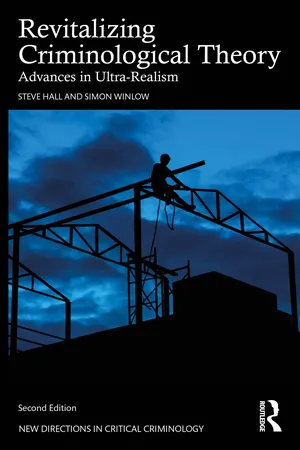
- English
- ePUB (mobile friendly)
- Available on iOS & Android
About this book
The second edition of Revitalizing Criminological Theory is a substantial revision and expansion of the first edition. Ultra-realism is a unique school of criminological thought currently establishing itself in the discipline despite resistance from traditional schools. The second edition still provides the undergraduate and postgraduate student reader with an invaluable guide to existing schools of thought and their roots in politics and philosophy, but with updated commentary on their intellectual flaws.
In the first edition, Hall and Winlow introduced a number of important new concepts that laid the foundations for an alternative theoretical framework and research programme in criminology. In three additional chapters written specially for this edition, they introduce further concepts and substantive revisions to the theoretical framework. They also outline and discuss in detail the growing body of award-winning criminological projects conducted by a new generation of researchers who have adopted and mobilised ultra-realist thinking over the past ten years. During this period of time, ultra-realism has also made significant progress towards its primary objectives of understanding human motivations, constructing insightful representations of reality and answering the fundamental zemiological question of why some human beings risk inflicting harm on others to further their own interests or achieve various ends. The philosophical and psychosocial approaches outlined in the first edition are now significantly advanced and able to offer a more detailed answer to this question and a convincing alternative to the traditional paradigms of conservatism, neoclassicism and left liberalism. Ultra-realism is now in a position to make some substantive contributions to the debate on the depth of political intervention required to get serious about reducing the impact of crime and harm on the lives of ordinary people.
This book is essential reading for academics and students engaged in the study of criminology, sociology, social psychology, the philosophy of social science and the history of crime.
Frequently asked questions
- Essential is ideal for learners and professionals who enjoy exploring a wide range of subjects. Access the Essential Library with 800,000+ trusted titles and best-sellers across business, personal growth, and the humanities. Includes unlimited reading time and Standard Read Aloud voice.
- Complete: Perfect for advanced learners and researchers needing full, unrestricted access. Unlock 1.4M+ books across hundreds of subjects, including academic and specialized titles. The Complete Plan also includes advanced features like Premium Read Aloud and Research Assistant.
Please note we cannot support devices running on iOS 13 and Android 7 or earlier. Learn more about using the app.
Information
Table of contents
- Cover
- Endorsement Page
- Half Title
- Series Page
- Title Page
- Copyright Page
- Dedication
- Table of Contents
- List of figures and tables
- Acknowledgement
- 1 Introduction
- 2 Mainstream classical and contemporary theories
- 3 The critical tradition
- 4 The radical realist response
- 5 Untangling the politics of criminological theory
- 6 The dawn of ultra-realist criminological theory
- 7 Adventures in ultra-realist research
- 8 Reality bites: A response to ultra-realism’s critics
- 9 Advances in ultra-realism’s theoretical framework
- 10 Conclusion: Still approaching the reality of our times
- Bibliography
- Index